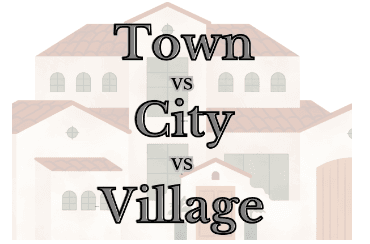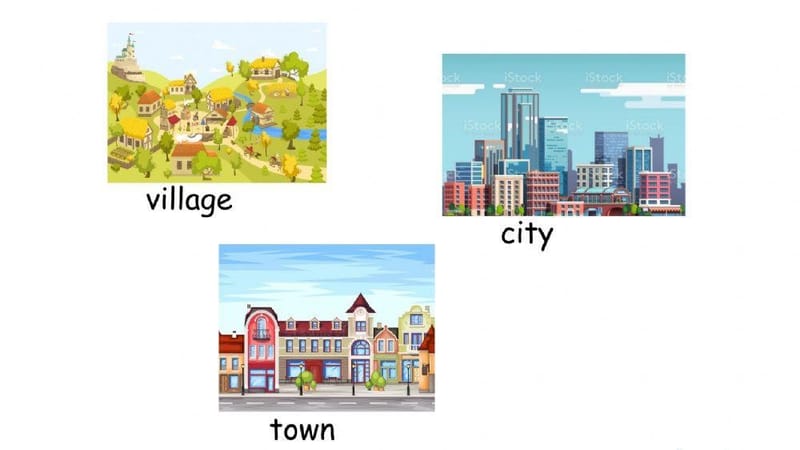Towns, Cities and Villages: Understanding the Settlement Vocabulary
Contents

If you've ever struggled to understand the differences between 'town', 'city', and 'village' in English, you're not alone. This can be especially tricky for English language learners in India. This is because the way these terms are used in India differs from English-speaking countries.
Understanding these differences is crucial. But don't worry! This article will clear up these confusing concepts for you.
With relatable examples, we'll explain the differences between a town, city, and village. Plus, we'll provide a step-by-step approach to help you differentiate between these terms and use them in your conversations. So let's dive straight into our exploration of 'town vs city vs village'!
What Do Town, City and Village Mean?
A town is a built-up area that is larger than a village but smaller than a city. It may serve as an administrative, economic, or educational centre for the surrounding rural areas. For example, Shimla in Himachal Pradesh is a well-known town in India.
A city refers to a large town. It has clear borders and most people follow a fast-paced lifestyle. It houses many amenities and infrastructures. Cities like Mumbai and Delhi are bustling metropolises in India.
A village denotes a small community in the countryside. It is often characterized by less population density and fewer amenities than towns or cities. An example would be Mawlynnong in Meghalaya which is called the cleanest village in Asia.
So, 'town', 'city', and 'village differ based on their size, population, facilities, lifestyle etc. Here is a table summarising these points:
Term | Size | Pace of Life | Facilities |
Town | Medium-sized | Moderate | Limited but growing |
City | Large-sized | Fast-paced | Advanced |
Village | Small-sized | Slow-paced | Basic |
Remember that each has its charm and challenges. You may often have to describe your hometown or migrate to other places. So, understanding these terms can help with your communication.
Town Vs City Vs Village: SomeCommon Confusions and Mistakes
We often encounter common mistakes while differentiating the terms town, city, and village. Let's explore a few:
Size Misconception: Many believe that only the size dictates whether a place is a town, city or village. But, it's more about administrative factors and population density.
Function Misinterpretation: Cities are often associated with bustling activity and villages with peace. While these assumptions can be true, they aren't strict rules.
Confusion over Urbanisation: Rapid urbanisation in India often blurs the boundaries between these terms.
To get past these language challenges, you need to practice regularly. It is also important to be aware of how our mother tongue influences our English abilities. Here is a useful guide to help you navigate such problems: How can you remove the mother tongue influencer problem in English Speaking? With time and effort, you'll confidently navigate these nuances of English communication!
Building Vocabulary Around Town, City, and Village

A good starting point while learning a language is to expand your vocabulary with phrases and idioms related to the words you learn. Here are some common idioms related to towns, villages and cities to make your conversations interesting:
'To go to town': This phrase means spending money carelessly. For example, "She always goes to town with her shopping at the annual sale."
'The talk of the town': This expression refers to someone who has become a subject of gossip due to their behaviour or lifestyle. For instance, "Since his dramatic weight loss, Rajesh has been the talk of the town."
'Fight city hall': Taking up a challenge against bureaucracy or authority is often referred to as fighting city hall. Example: "Despite knowing he might lose, Ravi decided to fight city hall over unfair property taxes."
'Village idiot': A person known for being foolish or silly is often called a village idiot. Example: "Don't listen to him; he's the village idiot."
'It takes a village': Rooted in a proverb, this idiom suggests that collective efforts are crucial for achieving big tasks. For example: "It takes a village to bring about social change."
Make sure to practice these expressions. Using them appropriately can make your spoken English more engaging and relatable!
Boosting Confidence in Spoken English: How Clapingo Can Help
Remember, understanding the differences between a town, city, and village is more than just about population size. It involves understanding their features. This includes their facilities and lifestyle to the governance and development level. Now that you're aware of what sets a town vs city vs village apart, use these terms accurately in your conversations!
Practicing is key. Make use of dictionaries or online resources to help clarify your understanding. For a personalised approach to improving your English skills, check out platforms like Clapingo.
Clapingo's coaching sessions aim to boost the confidence of non-native English speakers. Understanding how English is used in various settings, from towns to cities to villages, can improve your language skills. So the expert tutors at Clapingo assist you in navigating such different scenarios.
Your search for an English learning partner ends here at Clapingo. Let's start this rewarding journey of mastering spoken English together with confidence.
FAQs
1. What's the main difference between a town and a city?
Cities are typically larger than towns and have a higher population density. They also have more facilities like shopping centres and advanced healthcare facilities.
2. Are villages considered smaller than towns?
Yes, villages are generally smaller than towns in terms of geographical size and population. They also have fewer facilities compared to towns.
3. Do English learners often confuse town vs city vs village?
These terms refer to specific types of settlements and each has its unique features. Understanding these differences can enhance an English learner's vocabulary.
Comments
Your comment has been submitted